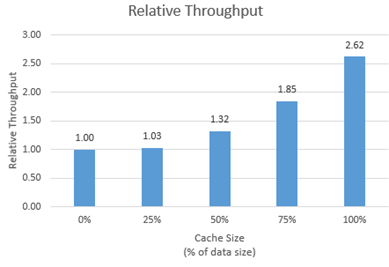Summary: New memory technologies are being developed by various hardware vendors (Intel DCPMM is one such technology currently available). These new memory types require different libraries for allocation and management (such as PMDK and memkind). The high capacities available make it possible to provision large caches (up to several TBs in size), beyond what is achievable with DRAM. The new allocator provided in this PR uses the memkind library to allocate memory on different media. **Performance** We tested the new allocator using db_bench. - For each test, we vary the size of the block cache (relative to the size of the uncompressed data in the database). - The database is filled sequentially. Throughput is then measured with a readrandom benchmark. - We use a uniform distribution as a worst-case scenario. The plot shows throughput (ops/s) relative to a configuration with no block cache and default allocator. For all tests, p99 latency is below 500 us.  **Changes** - Add MemkindKmemAllocator - Add --use_cache_memkind_kmem_allocator db_bench option (to create an LRU block cache with the new allocator) - Add detection of memkind library with KMEM DAX support - Add test for MemkindKmemAllocator **Minimum Requirements** - kernel 5.3.12 - ndctl v67 - https://github.com/pmem/ndctl - memkind v1.10.0 - https://github.com/memkind/memkind **Memory Configuration** The allocator uses the MEMKIND_DAX_KMEM memory kind. Follow the instructions on[ memkind’s GitHub page](https://github.com/memkind/memkind) to set up NVDIMM memory accordingly. Note on memory allocation with NVDIMM memory exposed as system memory. - The MemkindKmemAllocator will only allocate from NVDIMM memory (using memkind_malloc with MEMKIND_DAX_KMEM kind). - The default allocator is not restricted to RAM by default. Based on NUMA node latency, the kernel should allocate from local RAM preferentially, but it’s a kernel decision. numactl --preferred/--membind can be used to allocate preferentially/exclusively from the local RAM node. **Usage** When creating an LRU cache, pass a MemkindKmemAllocator object as argument. For example (replace capacity with the desired value in bytes): ``` #include "rocksdb/cache.h" #include "memory/memkind_kmem_allocator.h" NewLRUCache( capacity /*size_t*/, 6 /*cache_numshardbits*/, false /*strict_capacity_limit*/, false /*cache_high_pri_pool_ratio*/, std::make_shared<MemkindKmemAllocator>()); ``` Refer to [RocksDB’s block cache documentation](https://github.com/facebook/rocksdb/wiki/Block-Cache) to assign the LRU cache as block cache for a database. Pull Request resolved: https://github.com/facebook/rocksdb/pull/6214 Reviewed By: cheng-chang Differential Revision: D19292435 fbshipit-source-id: 7202f47b769e7722b539c86c2ffd669f64d7b4e1 |
||
|---|---|---|
| .circleci | ||
| buckifier | ||
| build_tools | ||
| cache | ||
| cmake | ||
| coverage | ||
| db | ||
| db_stress_tool | ||
| docs | ||
| env | ||
| examples | ||
| file | ||
| hdfs | ||
| include/rocksdb | ||
| java | ||
| logging | ||
| memory | ||
| memtable | ||
| monitoring | ||
| options | ||
| port | ||
| table | ||
| test_util | ||
| third-party | ||
| tools | ||
| trace_replay | ||
| util | ||
| utilities | ||
| .clang-format | ||
| .gitignore | ||
| .lgtm.yml | ||
| .travis.yml | ||
| .watchmanconfig | ||
| appveyor.yml | ||
| AUTHORS | ||
| CMakeLists.txt | ||
| CODE_OF_CONDUCT.md | ||
| CONTRIBUTING.md | ||
| COPYING | ||
| DEFAULT_OPTIONS_HISTORY.md | ||
| defs.bzl | ||
| DUMP_FORMAT.md | ||
| HISTORY.md | ||
| INSTALL.md | ||
| issue_template.md | ||
| LANGUAGE-BINDINGS.md | ||
| LICENSE.Apache | ||
| LICENSE.leveldb | ||
| Makefile | ||
| README.md | ||
| ROCKSDB_LITE.md | ||
| src.mk | ||
| TARGETS | ||
| thirdparty.inc | ||
| USERS.md | ||
| Vagrantfile | ||
| WINDOWS_PORT.md | ||
RocksDB: A Persistent Key-Value Store for Flash and RAM Storage
RocksDB is developed and maintained by Facebook Database Engineering Team. It is built on earlier work on LevelDB by Sanjay Ghemawat (sanjay@google.com) and Jeff Dean (jeff@google.com)
This code is a library that forms the core building block for a fast key-value server, especially suited for storing data on flash drives. It has a Log-Structured-Merge-Database (LSM) design with flexible tradeoffs between Write-Amplification-Factor (WAF), Read-Amplification-Factor (RAF) and Space-Amplification-Factor (SAF). It has multi-threaded compactions, making it especially suitable for storing multiple terabytes of data in a single database.
Start with example usage here: https://github.com/facebook/rocksdb/tree/master/examples
See the github wiki for more explanation.
The public interface is in include/. Callers should not include or
rely on the details of any other header files in this package. Those
internal APIs may be changed without warning.
Design discussions are conducted in https://www.facebook.com/groups/rocksdb.dev/
License
RocksDB is dual-licensed under both the GPLv2 (found in the COPYING file in the root directory) and Apache 2.0 License (found in the LICENSE.Apache file in the root directory). You may select, at your option, one of the above-listed licenses.